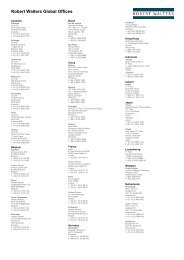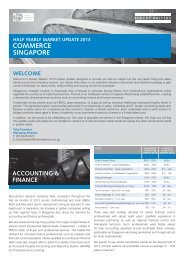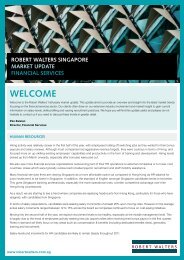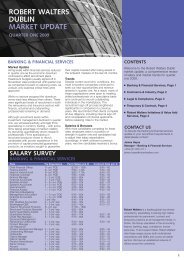- Page 1 and 2:
WELCOME TO THE FourtEENTH EDITION O
- Page 3 and 4:
CONTENTSCONTENTSCONTENTSDüsseldorf
- Page 5:
CONTENTSCONTENTSCONTENTSNEWZEALANDA
- Page 8 and 9:
LONDONLONDONACCOUNTING&FINANCEBANKI
- Page 10 and 11:
LONDONACCOUNTING&FINANCE-COMMERCE&I
- Page 12 and 13:
LONDONLONDONACCOUNTING&FINANCEINSUR
- Page 14 and 15:
LONDONLONDONACCOUNTING&FINANCEINVES
- Page 16 and 17:
LONDONLONDONCOMPLIANCELONDONCOMPLIA
- Page 18 and 19:
LONDONLONDONFRONTOFFICELONDONFRONTO
- Page 20 and 21:
LONDONHUMANRESOURCES-FINANCIALSERVI
- Page 22 and 23:
LONDONLONDONINFORMATIONTECHNOLOGYCO
- Page 24 and 25:
LONDONLONDONLEGALCOMMERCE&INDUSTRYL
- Page 26 and 27:
LONDONLEGAL-FINANCIALSERVICESLONDON
- Page 28 and 29:
LONDONLEGAL-PRIVATEPRACTICELONDONLE
- Page 30 and 31:
LONDONLEGAL-INTERNATIONALLONDONLEGA
- Page 32 and 33:
LONDONLONDONMARKETINGLONDONROLEEXEC
- Page 34 and 35:
LONDONLONDONOPERATIONSINVESTMENTBAN
- Page 36 and 37:
LONDONLONDONOPERATIONSINVESTMENTMAN
- Page 38 and 39:
LONDONLONDONOPERATIONSINVESTMENTMAN
- Page 40 and 41:
LONDONLONDONRISKLONDONROLEPERMANENT
- Page 42 and 43:
LONDONLONDONSALESLONDONSALESOursale
- Page 44 and 45:
LONDONLONDONSECRETARIAL&SUPPORTLOND
- Page 46 and 47:
LONDONTREASURY-COMMERCE&INDUSTRYLON
- Page 48 and 49:
NORTHOFENGLANDNORTHOFENGLANDACCOUNT
- Page 50 and 51:
NORTHOFENGLANDNORTHOFENGLANDBANKING
- Page 52 and 53:
NORTHOFENGLANDINFORMATIONTECHNOLOGY
- Page 54 and 55:
NORTHOFENGLANDNORTHOFENGLANDTRANSAC
- Page 56 and 57:
NORTHOFENGLANDSALESNORTHOFENGLANDSA
- Page 58 and 59:
MIDLANDSMIDLANDSBANKING&FINANCIALSE
- Page 60 and 61:
MIDLANDSMIDLANDSINFORMATIONTECHNOLO
- Page 62 and 63:
MIDLANDSMIDLANDSLEGALMIDLANDSLEGALL
- Page 64 and 65:
MILTONKEYNESMILTONKEYNESACCOUNTING&
- Page 66 and 67:
SOUTHEASTSOUTHEASTACCOUNTING&FINANC
- Page 68 and 69:
SOUTHEASTSOUTHEASTSALESSOUTHEASTSAL
- Page 70 and 71:
DUBLINDUBLINBANKING&FINANCIALSERVIC
- Page 72 and 73:
DUBLINDUBLINBANKING&FINANCIALSERVIC
- Page 74 and 75:
DUBLINDUBLINCOMMERCE&INDUSTRYACCOUN
- Page 76 and 77:
DUBLINDUBLINDUBLINCOMPLIANCECOMPLIA
- Page 78 and 79:
DUBLINDUBLINDUBLINLEGALLEGALMarketO
- Page 80 and 81:
BRUSSELSBRUSSELSACCOUNTING&FINANCEB
- Page 82 and 83:
BRUSSELSBRUSSELSBANKING&FINANCIALSE
- Page 84 and 85:
BRUSSELSBRUSSELSINTERIMMANAGEMENTBR
- Page 87 and 88:
As in 2009 and 2011, the Frenchjobs
- Page 89 and 90:
PARISPARISBANKING&FINANCIALSERVICES
- Page 91 and 92:
PARISPARISPARISCONSULTINGCONSULTING
- Page 93 and 94:
PARISPARISPARISHUMANRESOURCESHUMANR
- Page 95 and 96:
PARISPARISPARISINSURANCEINSURANCEOu
- Page 97 and 98:
PARISPARISPARISSALES&MARKETINGSALES
- Page 99 and 100:
PARISPARISPARISINTERIMMANAGEMENTINT
- Page 101 and 102:
WALTERSPEOPLE-BANKING&INSURANCE&REA
- Page 103 and 104:
PARISPARISPARISWALTERSPEOPLE-ITWALT
- Page 105 and 106:
HEALTHLYON&STRASBOURGLYON&STRASBOUR
- Page 107 and 108:
With Germany experiencingrelatively
- Page 109 and 110:
FRANKFURTFRANKFURTBANKING&FINANCIAL
- Page 111 and 112:
DÜSSELDORFDÜSSELDORFHUMANRESOURCE
- Page 113:
DÜSSELDORFDÜSSELDORFSALES&MARKETI
- Page 116 and 117:
LUXEMBOURGLUXEMBOURGBANKING&FINANCI
- Page 118 and 119:
LUXEMBOURGLUXEMBOURGBANKING&FINANCI
- Page 120 and 121:
NETHERLANDSNETHERLANDSACCOUNTING&FI
- Page 122 and 123:
NETHERLANDSNETHERLANDSBANKING&FINAN
- Page 124 and 125:
NETHERLANDSNETHERLANDSFINANCIALINTE
- Page 126 and 127:
NETHERLANDSNETHERLANDSINFORMATIONTE
- Page 128 and 129:
NETHERLANDSNETHERLANDSLEGALNETHERLA
- Page 130 and 131:
NETHERLANDSNETHERLANDSSALES&MARKETI
- Page 132 and 133:
NETHERLANDSNETHERLANDSTAX&TREASURYN
- Page 135 and 136:
Spain's unemployment ratejumped to
- Page 137 and 138:
MADRIDMADRIDFINANCIALSERVICES,COMME
- Page 139 and 140:
Although economic fundamentals(i.e.
- Page 141 and 142:
ZURICHZURICHBANKING&FINANCIALSERVIC
- Page 143:
ZURICHZURICHSUPPLYCHAIN&PROCUREMENT
- Page 146 and 147:
ACCOUNTING&FINANCESAOPAULOACCOUNTIN
- Page 148 and 149:
HUMANRESOURCESSAOPAULOHUMANRESOURCE
- Page 150 and 151:
SALES&MARKETINGSAOPAULOSALES&MARKET
- Page 152 and 153:
RIODEJANEIRORIODEJANEIROACCOUNTING&
- Page 154 and 155:
NEWYORKACCOUNTING&FINANCE-BANKING&F
- Page 156 and 157:
NEWYORKNEWYORKBANKINGOPERATIONSNEWY
- Page 158 and 159:
NEWYORKNEWYORKLEGAL&COMPLIANCENEWYO
- Page 160 and 161:
NEWYORKNEWYORKRISKMANAGEMENT&QUANTI
- Page 162 and 163:
NEWYORKNEWYORKSALES&MARKETINGLUXURY
- Page 164 and 165:
SANFRANCISCOSANFRANCISCOSALES,MARKE
- Page 166 and 167:
ADELAIDEACCOUNTING&FINANCE-BANKING&
- Page 168 and 169:
ADELAIDEADELAIDESALES,MARKETING&COM
- Page 170 and 171:
BRISBANEACCOUNTING&FINANCE-BANKING&
- Page 172 and 173:
BRISBANEBRISBANEACCOUNTING&FINANCEC
- Page 174 and 175:
BRISBANEBRISBANEACCOUNTING&FINANCEP
- Page 176 and 177:
BRISBANEBRISBANEHUMANRESOURCES&SAFE
- Page 178 and 179:
BRISBANEBRISBANEINFORMATIONTECHNOLO
- Page 180 and 181:
BRISBANEBRISBANELEGALBRISBANELEGALL
- Page 182 and 183:
BRISBANEBRISBANEMINING&RESOURCESBRI
- Page 184 and 185: BRISBANEBRISBANEPROCUREMENT,SUPPLYC
- Page 186 and 187: BRISBANEBRISBANESALES,MARKETING&COM
- Page 188 and 189: MELBOURNEMELBOURNEACCOUNTING&FINANC
- Page 190 and 191: MELBOURNEMELBOURNEACCOUNTING&FINANC
- Page 192 and 193: MELBOURNEMELBOURNEACCOUNTING&FINANC
- Page 194 and 195: MELBOURNEMELBOURNEHUMANRESOURCESMEL
- Page 196 and 197: MELBOURNEMELBOURNEINFORMATIONTECHNO
- Page 198 and 199: MELBOURNEMELBOURNESALES,MARKETING&C
- Page 200 and 201: MELBOURNEMELBOURNESECRETARIAL&BUSIN
- Page 202 and 203: PERTHPERTHACCOUNTING&FINANCEPERTHRO
- Page 204 and 205: PERTHPERTHINFORMATIONTECHNOLOGYPERT
- Page 206 and 207: PERTHPERTHMINING,ENGINEERING&SAFETY
- Page 208 and 209: PERTHPERTHPROCUREMENT,SUPPLYCHAIN&L
- Page 210 and 211: PERTHPERTHSALES&MARKETINGPERTHROLEP
- Page 212 and 213: SYDNEYSYDNEYACCOUNTING&FINANCEBANKI
- Page 214 and 215: SYDNEYSYDNEYACCOUNTING&FINANCEBANKI
- Page 216 and 217: SYDNEYSYDNEYACCOUNTING&FINANCECOMME
- Page 218 and 219: SYDNEYSYDNEYHUMANRESOURCESANDOH&SSY
- Page 220 and 221: SYDNEYSYDNEYINFORMATIONTECHNOLOGYBA
- Page 222 and 223: SYDNEYSYDNEYINFORMATIONTECHNOLOGYCO
- Page 224 and 225: SYDNEYSYDNEYLEGALSYDNEYLEGALLEGALRo
- Page 226 and 227: SYDNEYSYDNEYPROCUREMENT,SUPPLYCHAIN
- Page 228 and 229: SYDNEYSYDNEYRISKMANAGEMENT,COMPLIAN
- Page 230 and 231: SYDNEYSYDNEYSALES,MARKETING&COMMUNI
- Page 232 and 233: SYDNEYSALES,MARKETING&COMMUNICATION
- Page 236 and 237: BEIJINGBEIJINGACCOUNTING&FINANCEAND
- Page 238 and 239: BEIJINGBEIJINGBEIJINGBANKING&FINANC
- Page 240 and 241: BEIJINGBEIJINGSALES&MARKETINGBEIJIN
- Page 242 and 243: NANJINGNANJINGACCOUNTING&FINANCEAND
- Page 244 and 245: NANJINGNANJINGOPERATIONS&ENGINEERIN
- Page 246 and 247: SHANGHAISHANGHAIACCOUNTING&FINANCES
- Page 248 and 249: SHANGHAISHANGHAIBANKING&FINANCIALSE
- Page 250 and 251: SHANGHAISHANGHAIHUMANRESOURCESSHANG
- Page 252 and 253: SHANGHAISHANGHAIINFORMATIONTECHNOLO
- Page 254 and 255: SHANGHAISHANGHAISALES&MARKETINGSHAN
- Page 256 and 257: SHANGHAISHANGHAISALES&MARKETINGCONS
- Page 258 and 259: SHANGHAISHANGHAISALES&MARKETINGCONS
- Page 260 and 261: SHANGHAISHANGHAISUPPLYCHAIN&QUALITY
- Page 262 and 263: SUZHOUSUZHOUENGINEERINGSUZHOUENGINE
- Page 264 and 265: SUZHOUSUZHOUINDUSTRIALSALES&MARKETI
- Page 266 and 267: SUZHOUSUZHOUSUPPLYCHAIN&SOURCINGSUZ
- Page 268 and 269: HONGKONGHONGKONGACCOUNTING&FINANCEH
- Page 270 and 271: HONGKONGHONGKONGBANKING&FINANCIALSE
- Page 272 and 273: HONGKONGHONGKONGBANKING&FINANCIALSE
- Page 274 and 275: HONGKONGHONGKONGBANKING&FINANCIALSE
- Page 276 and 277: HONGKONGHONGKONGBANKING&FINANCIALSE
- Page 278 and 279: HONGKONGHONGKONGHUMANRESOURCES&BUSI
- Page 280 and 281: HONGKONGHONGKONGINFORMATIONTECHNOLO
- Page 282 and 283: HONGKONGHONGKONGINFORMATIONTECHNOLO
- Page 284 and 285:
HONGKONGHONGKONGLEGAL&COMPLIANCEHON
- Page 286 and 287:
HONGKONGHONGKONGSALES&MARKETINGHONG
- Page 288 and 289:
HONGKONGHONGKONGSALES&MARKETINGHONG
- Page 290 and 291:
HONGKONGHONGKONGSUPPLYCHAIN,LOGISTI
- Page 292 and 293:
HONGKONGHONGKONGPROPERTY&CONSTRUCTI
- Page 295 and 296:
Indonesia has a population ofapprox
- Page 297 and 298:
JAKARTAJAKARTAACCOUNTING&FINANCEJAK
- Page 299 and 300:
JAKARTAJAKARTABANKING&FINANCIALSERV
- Page 301 and 302:
JAKARTAJAKARTASALES&MARKETINGJAKART
- Page 303 and 304:
Due to continued economicuncertaint
- Page 305 and 306:
TOKYOTOKYOACCOUNTING,FINANCE&AUDITB
- Page 307 and 308:
TOKYOTOKYOACCOUNTING,FINANCE&AUDITC
- Page 309 and 310:
TOKYOTOKYOFINANCIALSERVICESOPERATIO
- Page 311 and 312:
TOKYOTOKYOHUMANRESOURCES,GENERALAFF
- Page 313 and 314:
TOKYOTOKYOINFORMATIONTECHNOLOGYFINA
- Page 315 and 316:
TOKYOTOKYOTOKYOINFORMATIONTECHNOLOG
- Page 317 and 318:
TOKYOTOKYOINFORMATIONTECHNOLOGYTECH
- Page 319 and 320:
TOKYOTOKYOLEGAL,COMPLIANCE&RISKTOKY
- Page 321 and 322:
TOKYOTOKYOSALES&MARKETINGTOKYOSALES
- Page 323 and 324:
TOKYOTOKYOSALES&MARKETINGTOKYOSALES
- Page 325 and 326:
TOKYOTOKYOSALES&MARKETINGTOKYOROLEP
- Page 327 and 328:
TOKYOTOKYOSUPPLYCHAINTOKYOROLEPERMA
- Page 329 and 330:
OSAKAOSAKAACCOUNTING&FINANCE,HUMANR
- Page 331:
OSAKAOSAKAACCOUNTING&FINANCE,HUMANR
- Page 334 and 335:
KUALALUMPURKUALALUMPURACCOUNTING&FI
- Page 336 and 337:
KUALALUMPURKUALALUMPURBANKING&FINAN
- Page 338 and 339:
KUALALUMPURKUALALUMPURBANKING&FINAN
- Page 340 and 341:
KUALALUMPURKUALALUMPURINFORMATIONTE
- Page 342 and 343:
KUALALUMPURKUALALUMPURLEGALKUALALUM
- Page 344 and 345:
KUALALUMPURKUALALUMPUROIL&GASKUALAL
- Page 346 and 347:
KUALALUMPURKUALALUMPURSALES&MARKETI
- Page 348 and 349:
KUALALUMPURKUALALUMPURSUPPLYCHAIN,P
- Page 350 and 351:
AUCKLANDAUCKLANDACCOUNTING&FINANCEA
- Page 352 and 353:
AUCKLANDAUCKLANDBANKING&FINANCIALSE
- Page 354 and 355:
AUCKLANDAUCKLANDHUMANRESOURCESAUCKL
- Page 356 and 357:
AUCKLANDAUCKLANDINFORMATIONTECHNOLO
- Page 358 and 359:
AUCKLANDAUCKLANDSALES&MARKETINGAUCK
- Page 360 and 361:
AUCKLANDAUCKLANDSECRETARIAL&BUSINES
- Page 362 and 363:
WELLINGTONWELLINGTONACCOUNTING&FINA
- Page 364 and 365:
WELLINGTONWELLINGTONENGINEERING&CON
- Page 366 and 367:
WELLINGTONWELLINGTONINFORMATIONTECH
- Page 368 and 369:
WELLINGTONWELLINGTONLEGALWELLINGTON
- Page 370 and 371:
WELLINGTONWELLINGTONSALES&MARKETING
- Page 373 and 374:
Overall hiring volumes wererelative
- Page 375 and 376:
SINGAPORESINGAPOREACCOUNTING&FINANC
- Page 377 and 378:
SINGAPORESINGAPOREBANKING&FINANCIAL
- Page 379 and 380:
SINGAPORESINGAPOREBANKING&FINANCIAL
- Page 381 and 382:
SINGAPORESINGAPOREBANKING&FINANCIAL
- Page 383 and 384:
SINGAPORESINGAPOREHUMANRESOURCESSIN
- Page 385 and 386:
SINGAPORESINGAPOREHUMANRESOURCESSIN
- Page 387 and 388:
SINGAPORESINGAPOREINFORMATIONTECHNO
- Page 389 and 390:
SINGAPORESINGAPORELEGAL&COMPLIANCES
- Page 391 and 392:
SINGAPORESINGAPORESALES&MARKETINGSI
- Page 393 and 394:
SINGAPORESINGAPORESALES&MARKETINGCO
- Page 395 and 396:
SINGAPORESINGAPORESECRETARIAL&SUPPO
- Page 397 and 398:
SINGAPORESINGAPORESUPPLYCHAIN,PROCU
- Page 399 and 400:
SEOULSEOULSEOULACCOUNTING&FINANCEAC
- Page 401 and 402:
SEOULSEOULSALES&MARKETINGSEOULSALES
- Page 404 and 405:
Following the presidential election
- Page 406 and 407:
TAIPEITAIPEIBANKING&FINANCIALSERVIC
- Page 408 and 409:
TAIPEITAIPEISALES&MARKETINGTAIPEISA
- Page 410 and 411:
Following the election of a newgove
- Page 412 and 413:
BANGKOKBANGKOKACCOUNTING&FINANCEBAN
- Page 414 and 415:
BANGKOKBANGKOKBANKING&FINANCIALSERV
- Page 416 and 417:
BANGKOKBANGKOKHUMANRESOURCESBANGKOK
- Page 418 and 419:
BANGKOKBANGKOKINFORMATIONTECHNOLOGY
- Page 420:
BANGKOKBANGKOKSALES&MARKETINGBANGKO
- Page 423 and 424:
HOCHIMINHCITYACCOUNTING&FINANCEHOCH
- Page 425 and 426:
HOCHIMINHCITYHUMANRESOURCESHOCHIMIN
- Page 427 and 428:
HOCHIMINHCITYHOCHIMINHCITYSALES&MAR
- Page 429 and 430:
HOCHIMINHCITYSUPPLYCHAIN&ENGINEERIN
- Page 431 and 432:
SOUTHAFRICASOUTHAFRICAACCOUNTING&FI
- Page 433 and 434:
SOUTHAFRICASOUTHAFRICAACCOUNTING&FI
- Page 435 and 436:
SOUTHAFRICASOUTHAFRICALEGAL&HUMANRE
- Page 437:
contact usCONTACT USAUSTRALIAAdelai









